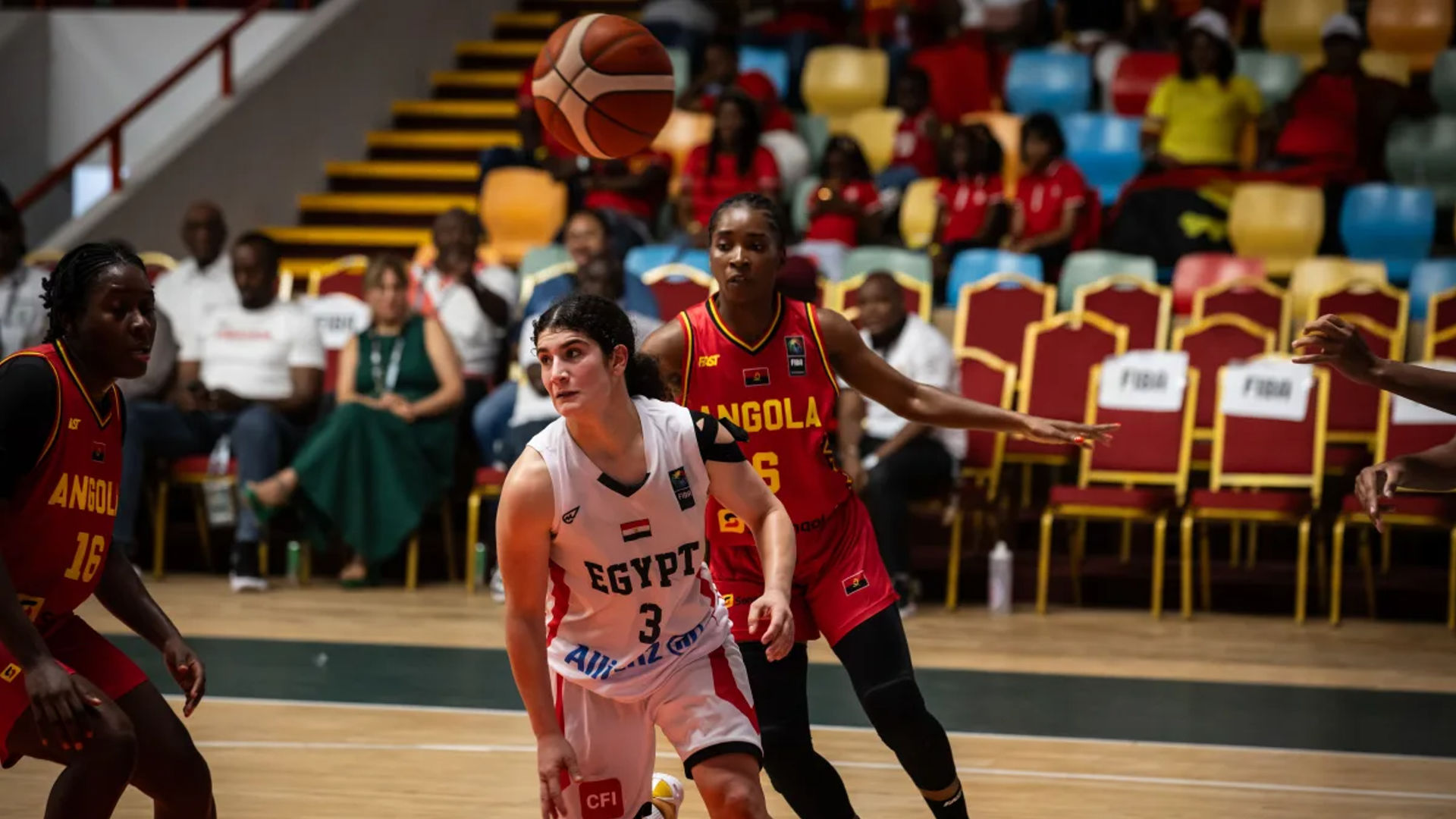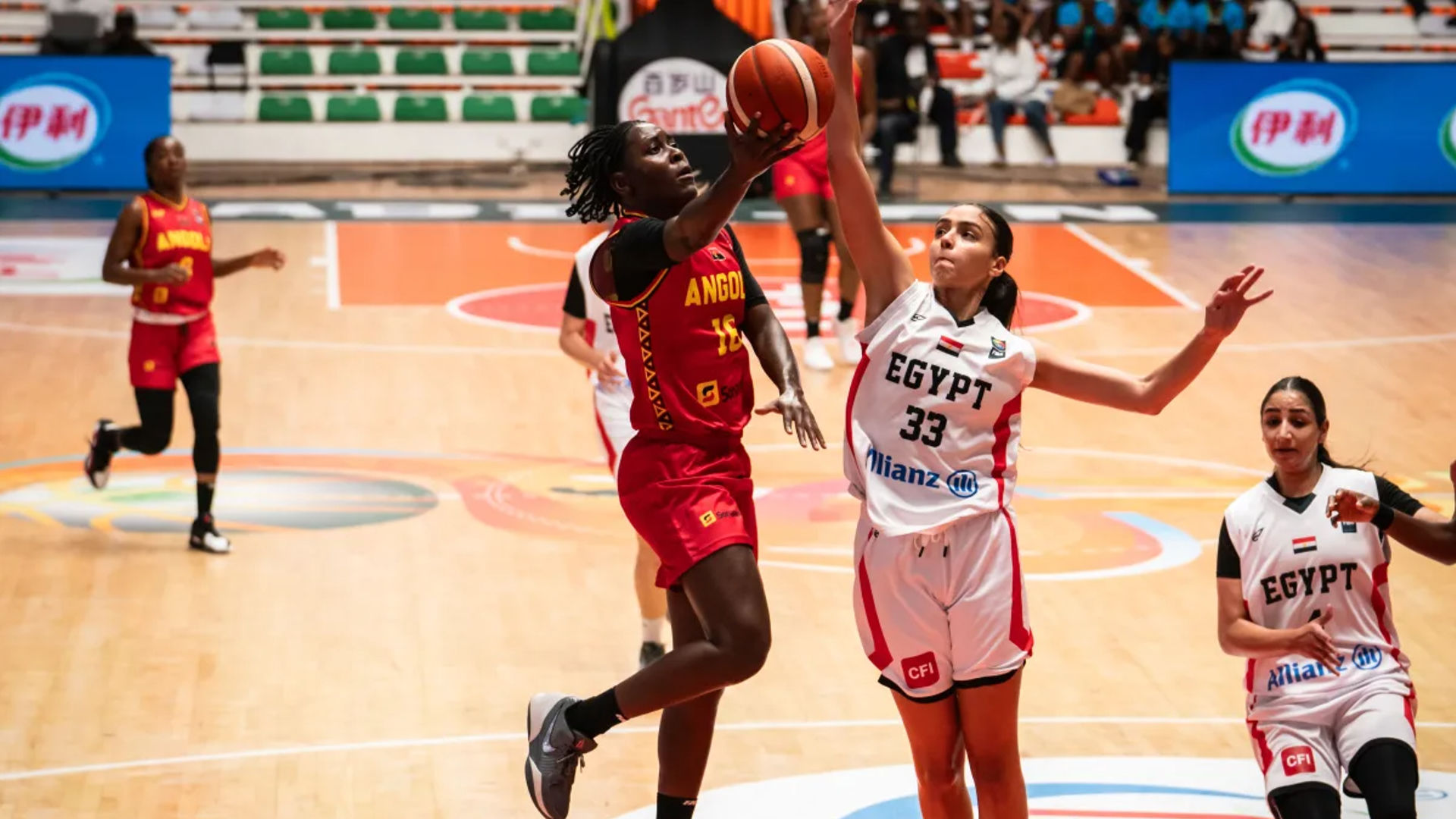Egypt bounced back from its opening loss at AfroBasket 2025 with a dominant 70–54 victory over Angola. Meral Abdelgawad and Raneem Elgedawy led the charge as Egypt’s defense and execution sparked a statement victory in Abidjan.
Last Updated on
July 27, 2025
.jpg)
.jpg)
Egypt reignited their AfroBasket campaign on Saturday with a commanding 70–54 win over Angola, less than 24 hours after falling to hosts Côte d’Ivoire. The result was not just a bounce-back—it was a revival. A team that looked rattled in their opener returned to the court with renewed focus, tightened execution, and a refusal to fold.
Knowing a second consecutive loss could likely seal their tournament exit, Egypt came out locked in from the first possession. Their defense pressed high, their rotations were crisp, and their offensive ball movement — so flat the day before — was suddenly precise and purposeful.
Angola, a traditional powerhouse in the women’s African game, met Egypt with early resistance. They managed to keep pace throughout a competitive first quarter. They even tied the score at 18-all, courtesy of a well-timed inbound pass from Italee Lucas that led to a clean finish by Alexia Dizeko. For a moment, the game appeared to be developing into a back-and-forth battle. That hope faded quickly.
Egypt responded instantly. Meral Abdelgawad drained a three-pointer, reestablishing the lead and setting the tone for what was to come. From that moment, the Egyptians took control—mentally, physically, and tactically—and never let go.
The second quarter was all Egypt. They unleashed a 12-0 run that sucked the air out of Angola’s offense and flipped the energy of the entire contest. Angola had no answers for Egypt’s defensive aggression, repeatedly forced into rushed possessions, low-percentage shots, and errant passes. By halftime, Egypt had built a 35-23 lead—earned through hustle, execution, and an edge that Angola couldn’t match.
At the break, the numbers told the story: Angola shot 0-for-10 from three and had committed 13turnovers. Egypt’s defense was unrelenting, and its offense fed off it. They weren’t just scoring—they were scoring in rhythm, creating open looks from the perimeter, and finishing at the rim with confidence.
.jpg)
Egypt finished the game shooting 7-for-20 from deep. It wasn’t lights-out shooting, but it was timely and team-oriented, precisely what they had lacked against Côte d’Ivoire. By the third quarter, Egypt’s dominance was unquestioned. They built their largest lead at 21 points, with Abdelgawad and Raneem Elgedawy continuing to pile on the pressure.
Elgedawy’s matchup against Cristina Matiquite proved pivotal. Her strong finish in traffic over the Angolan forward midway through the third quarter was not just a highlight—it was a statement. Egypt was outmuscling and outworking Angola on both ends of the court.
That’s when Egypt’s leadership came to the forefront. Point guard and captain Alia Elshabrawy, who orchestrated much of Egypt’s half-court offense and set the defensive tone at the top, spoke about the team’s turnaround.

“Keeping the score under 60points, and obviously it was a good day for us. Our main focus was to step upoffensively as a unit,” Elshabrawy said. “Angola has a lot of players, really talented individuals. So everybody knew their roles coming in. Whether you played five, 10 or 15 minutes, you knew we had to come in and keep that defense.
That’s what gave us urge. We’re taking energy from today’s win, and like I said, we want to have that personality of a team that doesn’t give up easily. We won’t give up without a fight. With most of these games, it will be physical from the jump. The thing is to keep being aggressive. We moved the ball a lot better than yesterday. We need to keep that momentum.”
Even with Abdelgawad limping off the court in the closing minutes, the team stayed composed. Egypt didn’t blink — they remained locked in and finished the job.
While Angola’s bench managed to outscore Egypt’s reserves 32–3, that stat felt hollow. The Angolan starters were overwhelmed from the second quarter onward and never regained their footing.
Head coach Paulo Macedo looked visibly frustrated as he cycled through his rotation, trying to ignite some spark. But every adjustment—whether tactical or personnel-based—was neutralized by Egypt’s discipline and energy.

Sara Caetano was the lone bright spot for Angola. She scored 18 points, fought for rebounds, and tried to rally her team in the face of mounting pressure. Dizeko added 11, but the rest of the squad was silent. The Angolan offense was stagnant, predictable, and disconnected—a sharp contrast to Egypt’s dynamic rhythm.
Egypt’s performance wasn’t just about two or three stars. While Abdelgawad and Elgedawy combined for 38 points and several big plays, six of Egypt’s eleven players contributed to the scoreboard.
The team shared the ball, fought through screens, and attacked the paint with confidence. It was a collective effort that reflected belief and preparation.
Now at 1–1, Egypt sits squarely in the quarterfinal conversation. Their win didn’t just extend their campaign—it redefined it. For a team that looked out of sync just a day prior, Saturday’s performance was a reminder of their potential.
Angola, by contrast, has no room left for error. With a difficult matchup against Côte d’Ivoire ahead, their path to the knockout stages has narrowed considerably. Their starters must respond — or risk a swift and disappointing exit.
Egypt’s fight back wasn’t flawless, but it was fearless. In a tournament defined by short turnarounds and high stakes, they showed resilience, the one quality every contender needs.
[Photogrpahy Courtesy of FIBA]